DevOps Engineer Resume Examples for 2024
DevOps engineers act as pivotal connectors between software developers and IT operations, necessitating strong collaboration, technical prowess in areas like automation, and effective communication. Their core responsibilities span monitoring, optimizing, and aligning IT projects' facets from development to deployment. The DevOps realm, integrating software development with IT operations, is burgeoning; valued at 3.62 billion dollars in 2018, projections estimate its worth to soar to $20.01 billion by 2026. This growth underscores its lucrative potential. To navigate this promising sector successfully, crafting a standout DevOps engineer resume becomes paramount. Our comprehensive guide equips you with essential insights to curate an impactful resume, enhancing your career prospects.
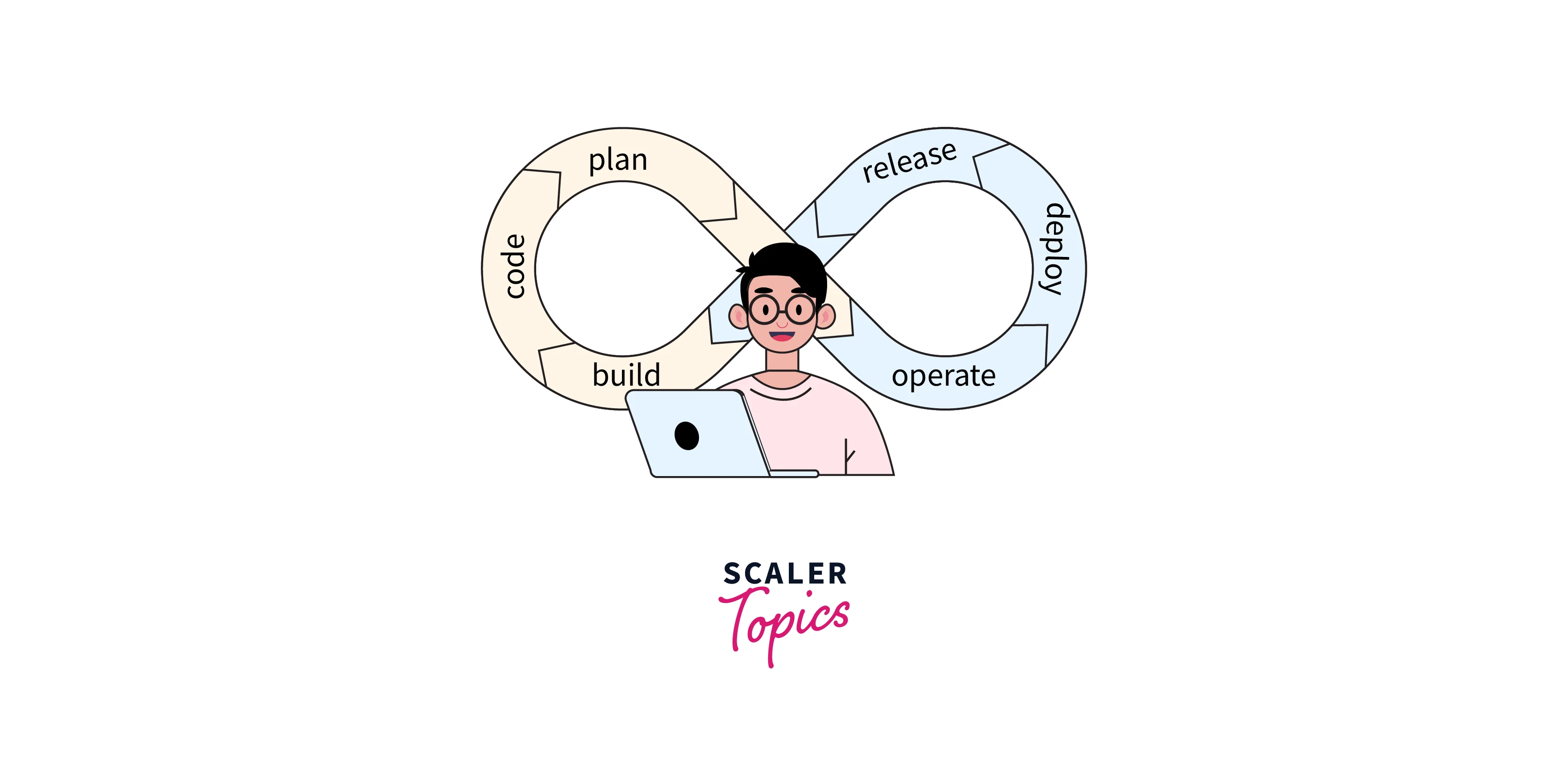
DevOps Engineer Resume Example
A DevOps Engineer Resume Example is a sample resume that illustrates the skills, experience, and qualifications of a DevOps Engineer. DevOps Engineers are responsible for managing the development, deployment, and maintenance of software applications. They work closely with software developers, system administrators, and other IT professionals to ensure that software applications are deployed efficiently and effectively.
A DevOps Engineer Resume Example should include the following components:
- Contact Information: Name, email, phone number, and address.
- Summary/Objective: A brief statement summarizing the candidate's experience and qualifications for the role of DevOps Engineer.
- Skills: A list of technical and non-technical skills relevant to the position, such as cloud computing, Linux administration, scripting languages, containerization, and automation tools.
- Work Experience: A detailed description of the candidate's previous work experience, including the organization, position, dates of employment, and key responsibilities and accomplishments. This section should emphasize the candidate's experience with software development, deployment, and infrastructure management.
- Community and Open-Source Work: A brief mention of the Open-Source contributions made in the DevOps tools and mention of some community work towards the DevOps domain.
- Education: The candidate's educational background, including degrees, certificates, and relevant coursework.
- Certifications: Any relevant certifications such as AWS Certified DevOps Engineer, Certified Kubernetes Administrator (CKA), or Certified Jenkins Engineer.
- Projects: Any relevant projects the candidate has worked on, highlighting the tools and technologies used and the results achieved.
- References: A list of professional references who can attest to the candidate's skills and qualifications.
When creating a DevOps Engineer Resume Example, it's important to tailor the resume to the specific job posting, emphasizing the skills and qualifications that are most relevant to the position. Additionally, the resume should be well-organized and easy to read, using bullet points and clear headings to highlight key information.
Here are some DevOps resume samples:
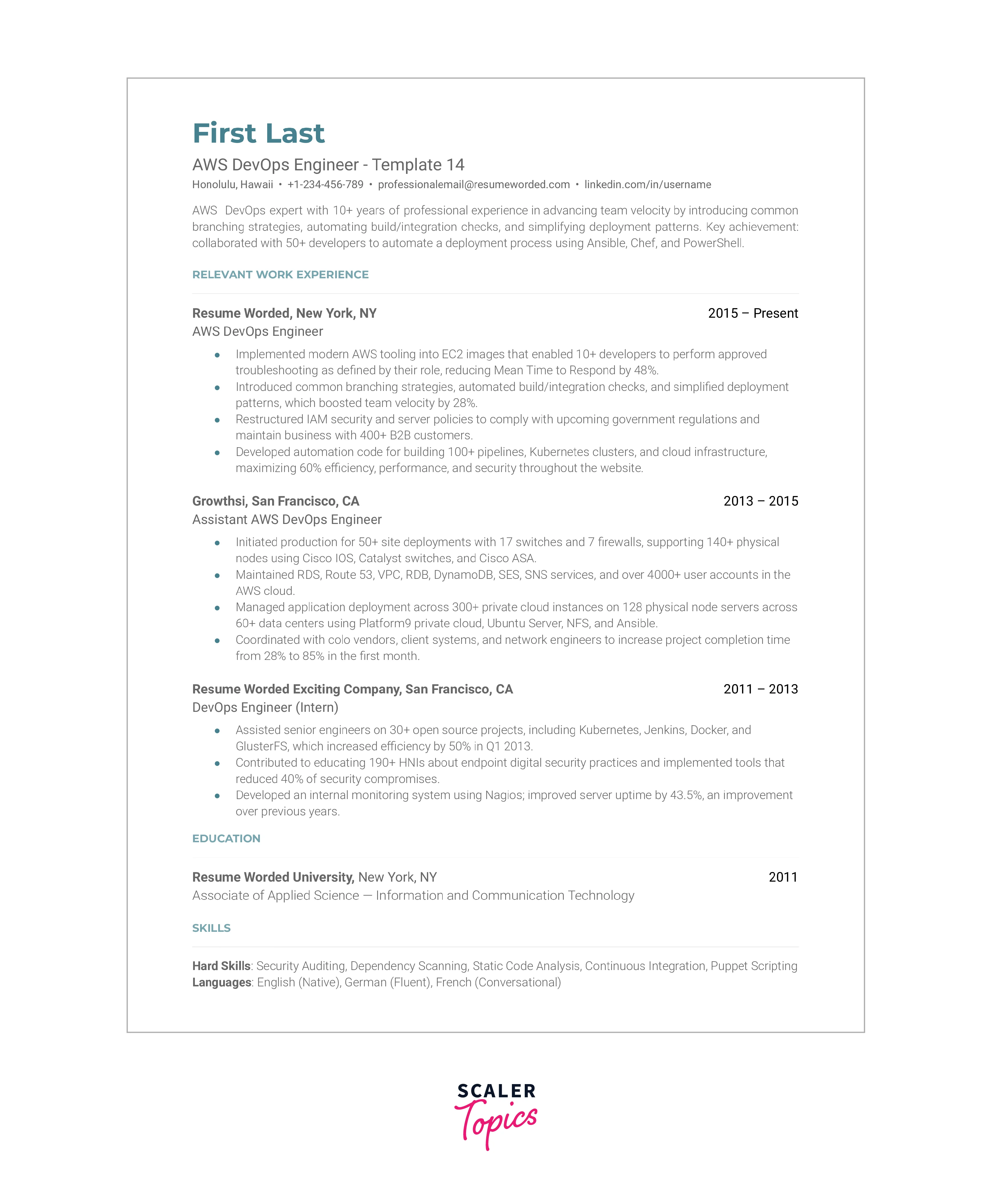
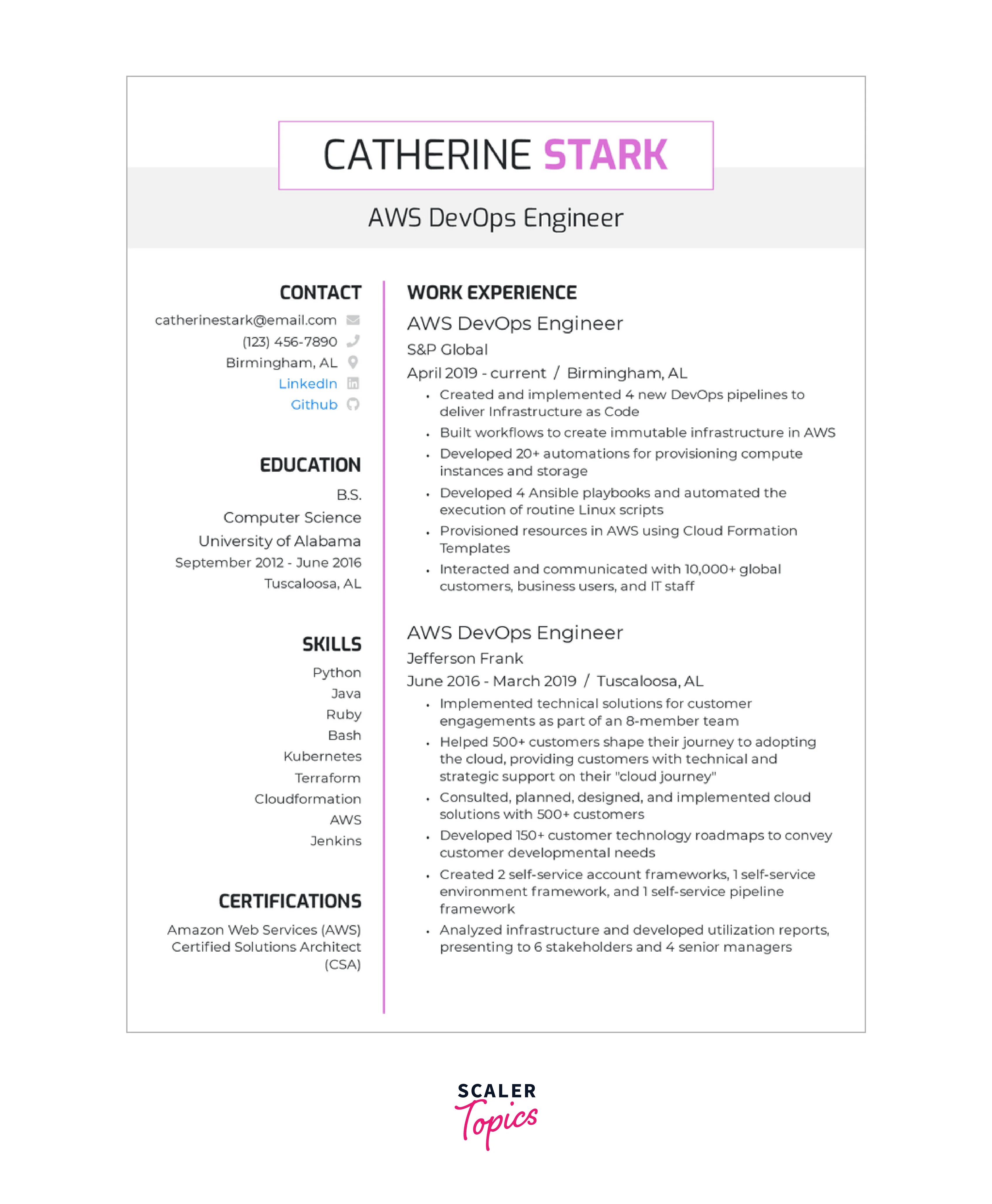
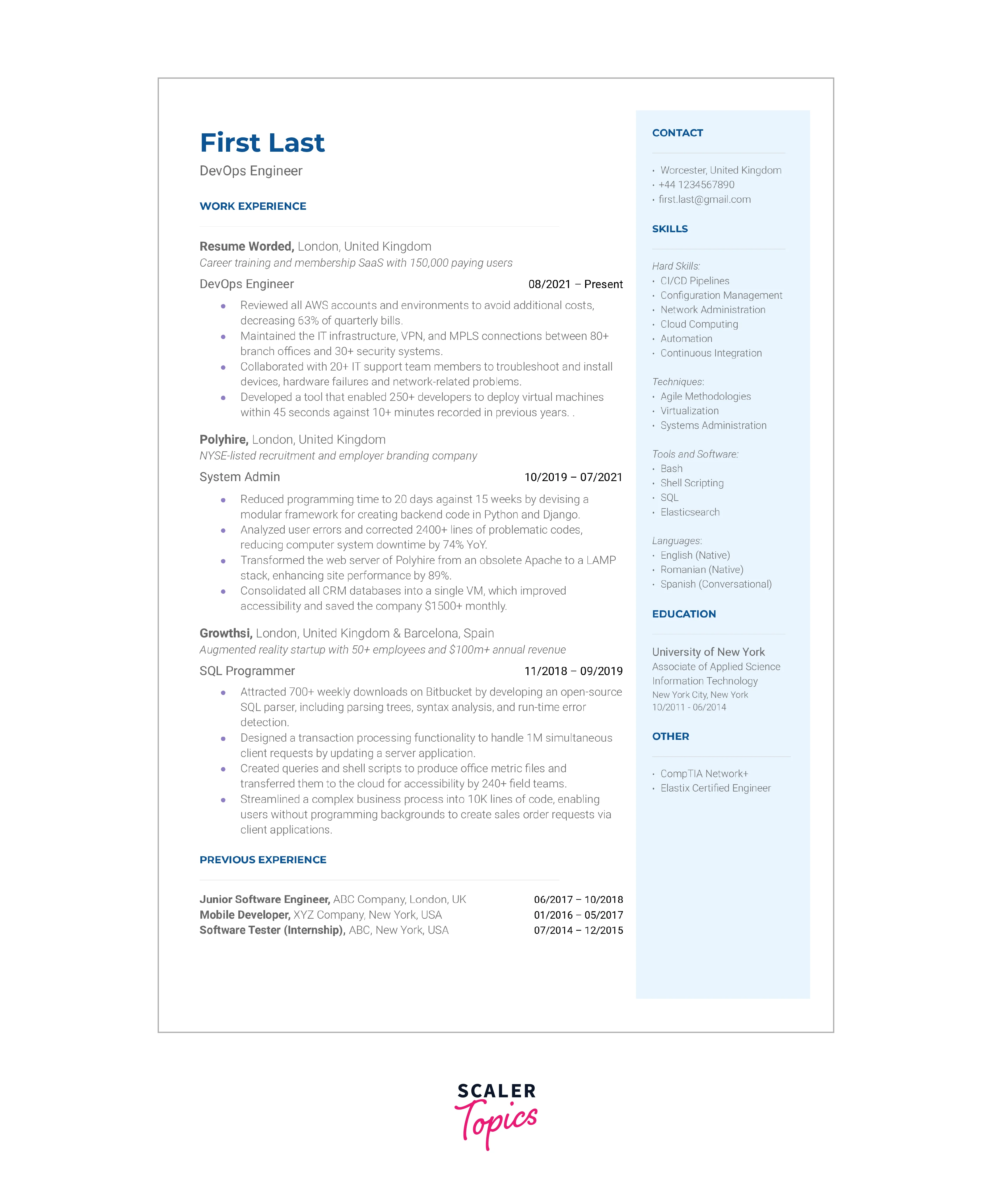
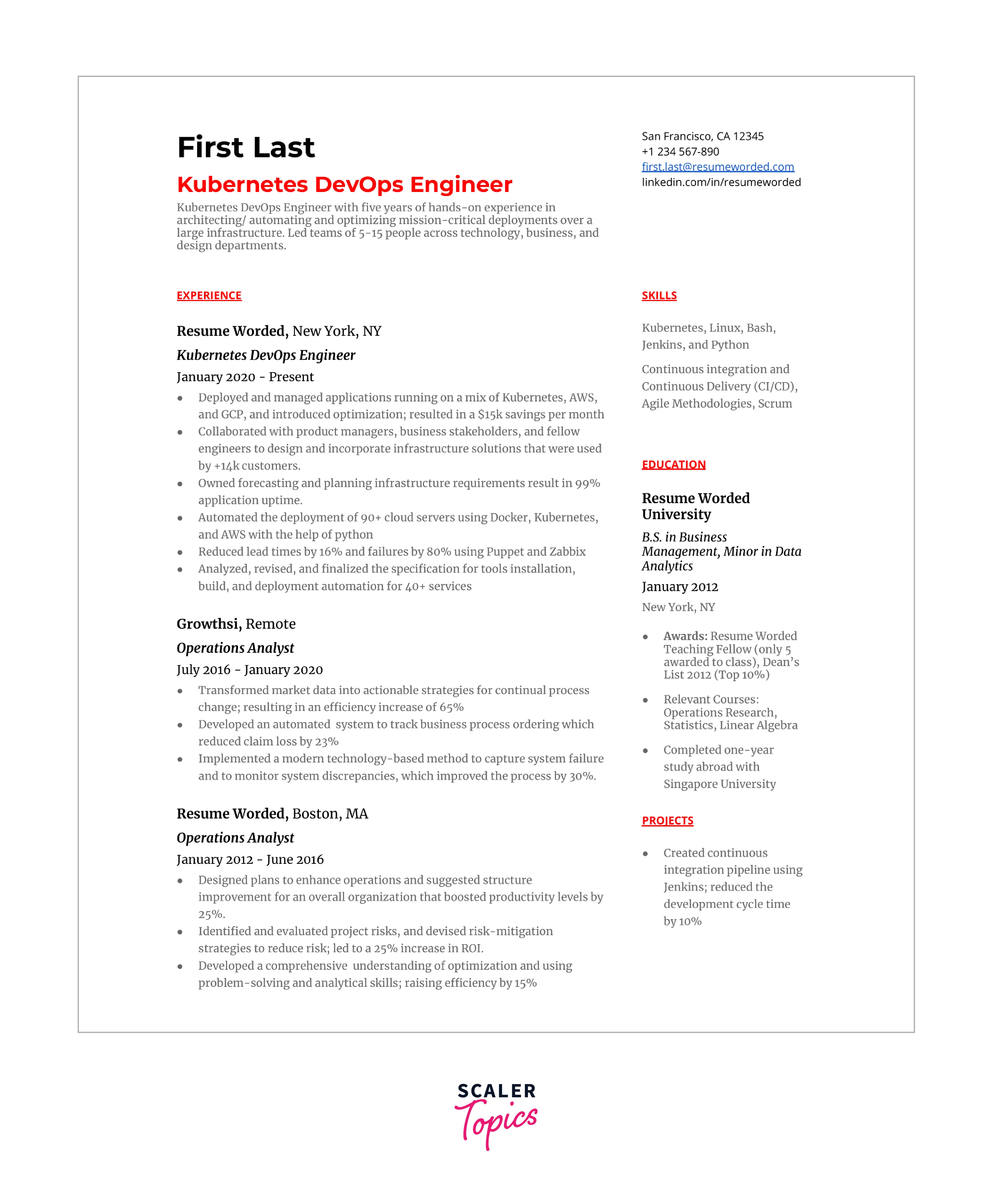
DevOps Engineer Job Description
A DevOps Engineer is responsible for the development and maintenance of software applications and systems that support the company’s business operations. They work collaboratively with software developers, QA engineers, and operations teams to automate processes, streamline workflows, and improve system reliability, performance and security. They ensure that any changes to the product are done in a timely and efficient manner.
You can find the following points included in a DevOps Engineer Job Description:
- Design, implement, and maintain automation and continuous delivery pipelines to ensure the smooth deployment of applications and services.
- Monitor, troubleshoot, and resolve complex production issues in a timely manner.
- Design, develop, and maintain configuration management and monitoring systems.
- Implement the best practices for continuous integration and continuous delivery.
- Develop and maintain system security and reliability processes.
- Collaborate with developers, system administrators, and other stakeholders to ensure the successful deployment of new applications and services.
- Analyze and optimize system performance and scalability.
- Stay up to date with the latest DevOps technologies and tools.
- Create technical documentation for DevOps processes and procedures.
- Ensure adherence to DevOps principles, processes, and standards.
Format Your DevOps Engineer Resume The Right Way
It is important to present your skills, experience, and qualifications in a clear and organized way on your resume when applying for a DevOps Engineer position. The formatting of your resume can greatly impact your chances of getting noticed by hiring managers and securing an interview.
Here are some tips for formatting your DevOps Engineer resume:
- Use a Clean and Professional Layout: Choose a clean and professional resume template that is easy to read and visually appealing. Use clear headers for different sections in your DevOps Engineer Resume.
- Use Appropriate Fonts: Use professional font styles for your resume and Avoid using overly complicated layouts or fonts that may distract from the content of your resume. You can use 10-12 font size for your various standard texting and 14-16 font size for section titles.
- Set Appropriate Margins: Set Appropriate page margins in a way that it gives plenty white spaces because it will give your DevOps Engineer Resume a clean look.
- Include Relevant Keywords: Hiring managers often use applicant tracking systems (ATS) to screen resumes. To increase the chances of your resume getting through the ATS, include relevant keywords and phrases from the job description.
- Use an Appropriate Order: Using an appropriate order in the resume can help a lot in creating a good resume. For Example: Skills, Work Experience should be written before Education, Projects.
- Keep It Concise: A DevOps Engineer resume should be no more than 2 pages long. Focus on the most relevant and impactful information and use bullet points to make the information easier to digest.
- Save It in PDF Format: Save your resume in PDF file format. PDF Format will allow you to upload anywhere or Mail your resume very easily.
Add Your Contact Information
Adding your contact information to your resume is an important step in ensuring that potential employers can easily get in touch with you. This information should be placed at the top of your resume, typically in a header or footer section.
Here are the key pieces of contact information that you should include in your resume:
- Full Name: Start by including your full name in a larger font size than the rest of your resume content. This will help your name stand out and make it easier for hiring managers to identify you.
- Email Address: You can include your professional email address which you check regularly. Avoid using personal or inappropriate email addresses, as they can make you appear unprofessional.
- Phone Number: Include a phone number where you can be reached, preferably a mobile number. Make sure to include the appropriate country code if you are applying for jobs outside of your home country.
- Mailing Address: Including your full mailing address is optional, but can be helpful if you are applying for jobs that require local candidates or if you are willing to relocate. You can add your City, State, and Country if a full mailing address is not required.
- LinkedIn Profile: Including a link to your LinkedIn profile can be helpful, as it allows potential employers to learn more about your professional background and skills.
- GitHub Link: Adding a GitHub link to your resume can be beneficial. It Showcases your code, collaboration skills, and project history to potential employers.
When adding your contact information to your resume, make sure that it is accurate and up-to-date. Double-check that your phone number and email address are correct and that you are reachable at both. Additionally, make sure that your email address and LinkedIn profile are professional and appropriate for job searching.
Write an Impactful DevOps Engineer Summary
The DevOps Engineer summary section of your resume is the first opportunity you have to make an impression on potential employers. An impactful summary should concisely highlight your key skills, experience, and achievements, and showcase how you can contribute to the organization.
Here are some tips for writing an impactful DevOps Engineer Summary:
- Focus On Your Expertise: Start by highlighting your areas of expertise, such as automation, cloud technologies, continuous integration and delivery, and security. Make sure to tailor your summary to the specific job you are applying for by including keywords and phrases from the job description.
- Quantify Your Achievements: Use numbers and statistics to demonstrate the impact you have made in previous roles. For example, you might mention how you reduced deployment times by a certain percentage or how you implemented a new automation process that resulted in cost savings for the organization.
- Emphasize Your Soft Skills: DevOps Engineers require a combination of technical and interpersonal skills. Emphasize your ability to work collaboratively with cross-functional teams, your strong communication and problem-solving skills, and your ability to thrive in a fast-paced environment.
- Keep It Concise: Your summary should be no more than 2-3 sentences long. Focus on the most relevant and impactful information and avoid including unnecessary details.
Here's an example of an impactful DevOps Engineer Summary:
"Results-driven DevOps Engineer with 5+ years of experience in infrastructure management, automation, and continuous integration and delivery. Skilled in cloud technologies such as AWS and Azure, and experienced in implementing security best practices. Proven track record of reducing deployment times by 50% and implementing automation processes that resulted in cost savings of $100,000 per year. Strong communicator with problem solving skills and with the ability to work collaboratively with cross functional teams."
By following these tips and crafting an impactful summary, you can grab the attention of potential employers and increase your chances of landing an interview for your dream DevOps Engineer position.
Describe Your DevOps Professional Experience
Describing your DevOps professional experience in your resume is crucial to showcasing your expertise and qualifications for the role. Your professional experience section should highlight your relevant work experience and accomplishments, and provide insight into how you have used DevOps practices to deliver value to previous employers.
Here are some tips for describing your DevOps professional experience in your resume:
- Start With Your Most Recent Experience: List your work experience in reverse chronological order, starting with your most recent position. This makes it easy for hiring managers to see your current level of experience.
- Highlight Your DevOps Experience: Focus on your experience in implementing DevOps practices and technologies, such as continuous integration and delivery, infrastructure as code, and automated testing. Use concrete examples to demonstrate your experience and accomplishments in these areas.
- Emphasize Collaboration: DevOps is all about collaboration between teams. Highlight your experience working with cross-functional teams, such as development, operations, and security, to deliver value to the organization.
- Use Action-Oriented Language: Use action-oriented language to describe your accomplishments and responsibilities in each position. For an example, instead of saying "Responsible for managing AWS infrastructure," you can say "Managed AWS infrastructure, resulting in a 50% reduction in deployment times."
- Quantify Your Achievements: Use numbers and statistics to quantify your achievements and demonstrate your impact on previous employers. For example, you might mention how you reduced downtime by a certain percentage or how you improved system performance.
- Keep It Concise: Focus on the most relevant and impactful information and avoid including unnecessary details. You can add 3-4 bullet points for per position.
Here's an example of how to describe your DevOps professional experience in your resume:
DevOps Engineer ABC Company, January 2018 - Present
- Implemented a continuous integration and delivery pipeline using Jenkins and Git, resulting in a 75% reduction in deployment times.
- Worked with development teams to implement infrastructure as code using Terraform, resulting in more efficient infrastructure management and improved system reliability.
- Led efforts to implement automated testing, resulting in a 50% reduction in testing time and increased confidence in deployments.
- Collaborated with security teams to implement security best practices, resulting in improved compliance with industry regulations and reduced security risks.
By following these tips and crafting a compelling description of your DevOps professional experience, you can demonstrate your expertise and qualifications for the role and increase your chances of landing an interview for your dream DevOps Engineer position.
Mention Your Education
Mentioning your education in your DevOps Engineer resume is an important component of showcasing your qualifications and expertise for the role. While formal education is not always required for DevOps roles, including your educational background can provide valuable information to potential employers about your training, knowledge, and experience.
When including your education in your resume, start with your highest degree or most recent education first. Here are some key information to add in your Education Section:
- Name of The Institution: Include the name of the educational institution where you received your degree or certification.
- Degree or Certification: Specify the degree or certification you received, such as a Bachelor's degree in Computer Science or a certification in AWS.
- Field of Study: Indicate your field of study, such as Information Technology, Computer Science, or a related field.
- Graduation Date: Include the date you graduated or completed your degree or certification program.
If you have relevant coursework, projects, or extracurricular activities that demonstrate your skills and knowledge in DevOps, consider including them in the education section or creating a separate section for "Relevant Coursework" or "Projects."
Keep in mind that while education is an important component of your DevOps Engineer resume. Overall, including your education in your DevOps Engineer resume can provide valuable information to potential employers and help you stand out as a qualified candidate for the role.
Add Relevant Skills
As a DevOps engineer, it's essential to showcase your relevant skills in your resume. Relevant skills are the abilities and competencies that directly relate to the position you are applying for. Adding these skills to your resume helps the hiring manager quickly identify if you have the required skill set for the job.
When adding relevant skills in your DevOps engineer resume, consider the following tips:
- Review The Job Description: Start by reviewing the job description to identify the specific skills the employer is looking for in a DevOps engineer. Make sure to include the skills in your resume which are given in the Job Description.
- Highlight Technical Skills: Knowledge of programming languages such as Python, Java, or Ruby; experience with infrastructure as code tools such as Terraform or Ansible; proficiency in containerization technologies such as Docker or Kubernetes; experience with cloud platforms such as AWS or Azure.
- Soft Skills: Strong communication and collaboration skills to work effectively with cross-functional teams; ability to prioritize tasks and manage time effectively; problem-solving and analytical skills to troubleshoot issues and implement solutions.
- Showcase Collaboration and Communication Skills: DevOps is a collaborative practice that involves working with various teams, including developers, operations, and business stakeholders. Highlight your ability to collaborate and communicate effectively in your resume.
- Emphasize Automation Skills: DevOps engineers are responsible for automating processes to improve efficiency and reduce errors. Showcase your experience with automation tools like Chef, Puppet, and SaltStack.
- Demonstrate Problem-Solving Skills: DevOps engineers need to be adept at problem-solving. Highlight your experience in troubleshooting, debugging, and resolving issues in your resume.
By highlighting your relevant skills in your DevOps engineer resume, you increase your chances of catching the hiring manager's attention and securing an interview for the position.
30 DevOps Engineer Skills (For 2023)
Here are some in-demand skills in 2023 for The DevOps Engineer Role:
Soft Skills
- Collaboration: Collaboration skill in DevOps is the ability to work effectively with teams across departments and disciplines towards a common goal.
- Problem Solving: Problem Solving skill in DevOps involves identifying, analyzing, and resolving complex issues in software development and deployment processes.
- Communication: Communication skill in DevOps is the ability to effectively convey ideas, share feedback, and coordinate with teams to ensure project success.
- Critical Thinking: It involves evaluating information to make sound decisions and solve complex problems.
- Creative Thinking: It involves generating innovative ideas and solutions to improve software development and deployment processes.
- Active Learning: It involves continuous learning and adapting to new technologies, processes, and best practices.
- Adaptability: It is the ability to adjust to changing situations and requirements in software development and deployment.
- Leadership: It involves guiding and motivating teams to achieve project goals and drive continuous improvement.
- Perceptiveness: Perceptiveness skill in DevOps involves being aware of team dynamics and individual needs to foster collaboration and productivity.
- Decision Making: It involves analyzing information to make informed choices that align with project objectives.
Hard Skills
- Operating Systems: It involves proficiency in various operating systems to manage infrastructure and applications.
- Security: Security in DevOps helps implementing measures to protect software and infrastructure from potential threats and vulnerabilities.
- Build and Release: Build and Release involves managing the build and release process of software applications.
- Networking Protocols: Networking Protocols skill helps DevOps professionals to manage and configure networking devices, protocols and services.
- Deployment: Deploying applications in production using automated processes and tools.
- Source Control: Source control skill means managing source code and other related artefacts in a version control system.
- Containers: It helps to use containerization technology like Docker to deploy and manage applications in a portable and scalable manner.
- Configuration Management: Automating the management and deployment of infrastructure and software configurations to ensure consistency and reliability.
- Programming: It is an essential skill for DevOps to automate tasks, build tools, and manage infrastructure.
- Monitoring: Monitoring skill is needed to track performance, identify issues and optimize DevOps processes.
Tools
- Unix/Linux: Unix/Linux skills are essential in DevOps, enabling automation, scripting, and system administration.
- Jenkins: Jenkins is a powerful automation tool used in DevOps for Continuous Integration and Continuous Delivery of applications.
- GIT: Git is a version control system used in DevOps to store, track, and manage changes to software code.
- Salt/Ansible: Salt/Ansible is a configuration management and automation tool used in DevOps to automate the deployment and management of applications.
- Puppet/Chef: Puppet/Chef are automation tools used to configure and manage systems in a DevOps environment.
- AWS/VMWare: AWS/VMWare skills in DevOps involve the management and maintenance of cloud-based infrastructure and applications.
- Docker: Docker is a containerization technology used in DevOps to improve scalability and flexibility.
- Apache/Nginx: Apache/Nginx are web servers used for DevOps to manage and deploy applications in a more efficient way.
- Python/Perl: Python/Perl are important scripting languages used in DevOps automation and orchestration tasks.
- Zabbix/Sensu: Zabbix/Sensu skills in DevOps helps in monitoring, alerting, and automation of processes to ensure the smooth functioning of IT environments.
Make Use of These Additional Sections
Here are some useful additional sections to add in your resume:
Certifications
Certifications in a DevOps engineer resume are professional qualifications that demonstrate expertise in a specific area of DevOps. Including relevant certifications in your resume can validate your skills and set you apart from other candidates. When adding certifications, choose relevant ones, prioritize them by relevance, and provide context on how you applied your skills. Doing so can increase your chances of getting hired for the position. Some Common DevOps certifications include AWS Certified DevOps Engineer, Red Hat Certified Ansible Automation Engineer, Microsoft Certified Azure DevOps Engineer, and Certified Kubernetes Administrator. Acquiring these certifications shows potential employers that a DevOps engineer has the knowledge and skills to help an organization successfully implement DevOps practices.
Publications, Such as Scientific Articles
Publications, such as scientific articles, can be a valuable addition to a DevOps engineer resume, as they demonstrate a candidate's ability to research, analyze, and present complex information. In the DevOps field, where continuous learning and improvement are highly valued, publishing articles can showcase a candidate's expertise and thought leadership. When including publications in a DevOps engineer resume, it's important to choose relevant ones that align with the job requirements. Highlighting the publication type, providing publication details such as title, authors, publication date, and the publisher or journal where the article was published, and providing context on the article's main points and how it relates to the job can be helpful. Additionally, if the candidate was the primary author, they can highlight their contribution and how it demonstrates their skills and expertise in DevOps. Including publications can differentiate a candidate from other applicants and increase their chances of being selected for an interview.
Recognitions
Recognitions in a DevOps engineer resume are awards, honors, or special recognition that a candidate has received for their contributions or achievements in the field. Including recognitions in a resume can demonstrate a candidate's commitment, expertise, and leadership in the DevOps community. It can also help differentiate a candidate from other applicants and increase their chances of being selected for an interview. When including recognitions in a DevOps engineer resume, it's important to highlight the award or honor, the organization that issued it, and the date it was received. If applicable, providing additional context on the achievement and how it relates to the job requirements can also be helpful. By showcasing recognitions in their resume, candidates can demonstrate their dedication and expertise in the DevOps field and enhance their professional profile.
Volunteer Experience
Volunteer experience in a DevOps engineer resume refers to any unpaid work or activities that an individual has undertaken to support DevOps initiatives or projects. This could include volunteering for a non-profit organization or contributing to open-source projects related to DevOps. Having volunteer experience on a DevOps engineer resume can demonstrate a candidate's passion for the field, their willingness to learn and collaborate with others, and their ability to work on real-world projects beyond their professional responsibilities. It also shows that they are committed to making a positive impact in the community, which can reflect well on their character and work ethic.
Attach a Cover Letter To Your DevOps Resume
Attaching a cover letter to your DevOps resume means including a personalized letter that accompanies your resume when you submit it for a job application. A cover letter provides an opportunity to introduce yourself, explain your interest in the position, and highlight relevant skills and experiences that make you a good fit for the job.
In the cover letter, you can address the employer by name and explain why you are interested in the specific company and position. You can also use the letter to provide more context about your skills and experiences and how they align with the requirements of the job. This can help you stand out from other candidates who may only submit a resume.
A cover letter also allows you to demonstrate your writing skills and attention to detail, both of which are important in a DevOps role where effective communication and accuracy are critical. Overall, attaching a cover letter to your DevOps resume can increase your chances of getting noticed by a potential employer and ultimately getting hired.
Empower Your Career with DevOps Expertise! Enroll in Our DevOps Certification Course and Navigate the Future of Continuous Integration and Delivery.
Conclusion
- From this article, We have learned how to write a perfect DevOps Engineer Resume.
- A DevOps Engineer is responsible for developing, deploying and maintaining the software and hardware infrastructure of an organization, as well as creating and managing tools to automate processes.
- DevOps Engineer Job Description states that what a company needs in terms of skills, experience and education etc.
- DevOps resume sample shows that we should make our resume professional and according to the job description.
- Key things to add while making a resume for DevOps Engineer are formatting, contact information, education, impactful summary, relevant skills and professional work experience etc.
- Relevant Soft Skills, Technical skill and Tools knowledge is required to apply for a DevOps Engineer position.
- Some Additional sections for a DevOps Engineer Resume are certifications, publications, hobbies, volunteer experience and recognitions.
- Attaching a cover letter with DevOps Engineer Resume while applying for a position can help the candidate to show interest and ability to stand for the position.
